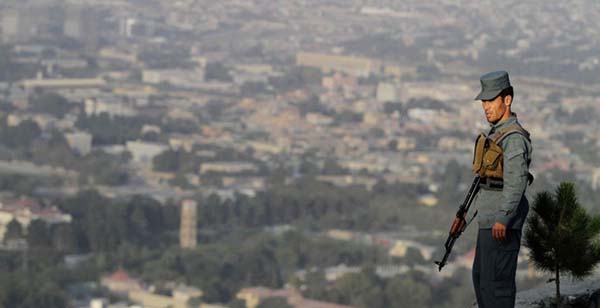Democracy is increasingly believed to be a factor of security and peace within a state. Security and peace remain a yearning for Afghan people. It appears to have turned into a pipe dream. Afghanistan has gone through three decades of conflicts and warfare. Conflict begins when demands are not negotiated and disagreements are not solved through political process, and holders of competing demands recourse to violence. The demands could be for political participation, balanced development and justice and equality. In addition to internal disasters, the country also constituted threat to international peace and stability, which manifested in 9/11 attacks.
Being mindful of the years of conflicts and positing way to move the country towards stability and peace, the preamble of Afghan constitution says, “Realizing the previous injustices, miseries and innumerable disasters which have befallen our country... Comprehending that a united, indivisible Afghanistan belongs to all its tribes and peoples; And in order to: Strengthen national unity, safeguard independence, national sovereignty and territorial integrity of the country; Establish an order based on the peoples’ will and democracy; Form a civil society void of oppression, atrocity, discrimination as well as violence, based on rule of law, social justice, protecting integrity and human rights, and attaining peoples’ freedoms and fundamental rights.”
There are legal frameworks in place for the country to open in democratic front. Democracy is founded on some basic principles that include: political participation and government by consent; political equality; and universal citizen and human rights. Sociologist Robert Putman considers that there will be no democracy and no economic development if there is no strong “social capital”, that is to say, a whole set of relations of trust between the members of a society that permit them to devote themselves to the good of the enterprise or the nation instead of remaining prisoners of “amoral familism,”(Peace and Democracy/Alain Caillé). To unmitigated chagrin, this continues to remain the culture in Afghanistan. The conflicts in Afghanistan were mainly rooted in exclusiveness and monopolization. They also had ethnic causes. ‘Horizontal inequalities’ between different identity groups are a major source of insecurity, with ethnic, religious etc. signifiers used to mobilize people and groups into violence. This is the etiology of conflicts and disputes in Afghanistan. In order to understand how democracy is a factor of security and peace, we need to define war and conflict. There are many definitions of war. Cicero defines war broadly as “a contention by force.” Denis Diderot comments that war is “a convulsive and violent disease of the body politic.” Karl von Clausewitz believes “war is the continuation of politics by other means.”
Citizens of democracies tend to calculate the cost of violence in solving their disputes, which leads them to discussion and negotiations. There are cases where democracy has led to or provided conditions for development. Both democracy and development can not be sustainable without justice.
Today, Afghanistan ranks first in poppy production, second in corruption and maternal mortality. It is also one of the largest aid-recipient countries of the world. This is not Afghanistan’s appropriate place. Though it is said that “democracies make elections, elections do not make democracy,” the people of Afghanistan showed considerable interest in elections. Against incredible odds, the Afghan people showed amazing courage and determination. Many stood in lines, amidst heat, dust and heavy rain, for considerable periods of time, exposed not just to the elements, but to potential rocket-propelled grenades, car bombs, and drive-by assassins.
Now that Afghan government is intent on reconciling with Taliban and other insurgent factions, it is important to note that the political architecture of future Afghanistan needs to be pluralistic and democratic to redress the past injustices and to provide for the participation and growth of all Afghan tribes, sub-cultures and ethnics. This is what article six of the constitution sets out, “the state shall be obligated to create a prosperous and progressive society based on social justice, preservation of human dignity, protection of human rights, realization of democracy, attainment of national unity as well as equality between all peoples and tribes and balance development of all areas of the country.”
The recent overemphasis on military issues at the expense of efforts to promote genuine development and good government matters not only because of the resulting human cost, but also because poverty, unemployment and weak, corrupt government are important drivers of conflict. Also, the government’s hyperbole of stress on reconciliation alone will not bring any permanent peace and durable security.
Ultimately, these factors must be effectively addressed if there is to be any sustainable improvement in security and a lasting peace for Afghans.
Afghanistan is having the last chance to build a legitimate and secure Afghan state, no longer prone to turning into safe haven for terrorists and extremists. While Afghan government and people should prod their inter- national allies to defeat insurgency or compel them into embracing reconciliation process without any compromise on the constitution, they themselves should also take some bold steps or make effective move. They have to bring about social capital, moving away from the tribalism, exclusive approaches and divisive politics.
Afghan constitution is based on inclusiveness and provides for the rights of all Afghan citizens. Any back- tracking from these constitutional rights will plunge the country back into insolvable chaos. In another item, the peace proposal sets forth, “Foreign fighters will not stay in Afghanistan after the withdrawal of foreign troops.” Withdrawal of international forces before foreign militants is tantamount to paving the way for take- over of those foreign fanatic fringes. Afghanistan can not afford to become abode for religious fanaticism and international terrorism.

